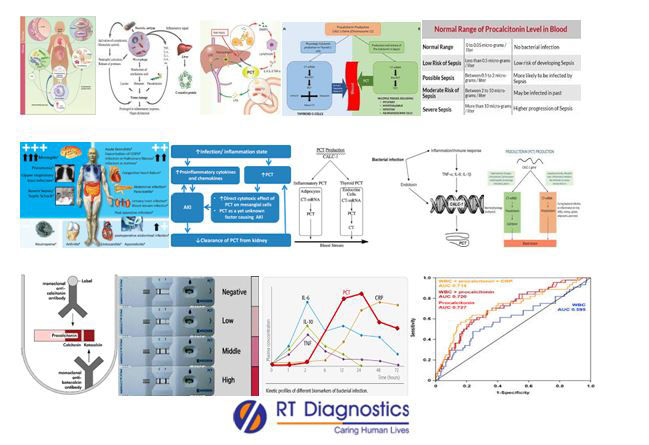Procalcitonin:
Why Procalcitonin Test ?
CLINICAL INFORMATION
A bacterial infection when getting access is confined by the immune system limiting it within its infected area. However, at times certain factors enable its spread from the site of infection into the systemic circulation (bacteremia) which may lead to sepsis. Sepsis is an overwhelming (life-threatening) and potentially, deadly condition in which the body over-reacts to bacterial infection by releasing substances which provoke systemic inflammatory reactions and hence there is a concomitant increase in the levels of procalcitonin in the body. Untreated sepsis can lead to organ failure and death. Bacterial infection induces an increase in the gene expression of CALC-1 that triggers the synthesis of procalcitonin (since being an acute-phase protein). Other associated factors which can also induce (triggering agents) the CALC-1 gene (which elevates the levels of PCT) include causes such as tissue injury, inflammation, lipopolysaccharide, microbial toxin, inflammatory mediators such as IL-6, TNF-alpha etc. Procalcitonin (PCT) is a member of calcitonin (CT) superfamily of peptides. PCT is located on the CALC-1 gene on chromosome 11. Procalcitonin is a peptide precursor of the hormone calcitonin, synthesized by parafollicular cells of the thyroid gland and by the neuroendocrine cells of the lungs and the intestine. Procalcitonin is synthesized from pre-procalcitonin (by enzymatic cleavage of endopeptidase). It has a key role in calcium homeostasis. Thus calcitonin helps to decrease calcium absorption by osteoclastic cells, hence it increases the circulating levels of calcium. The levels of procalcitonin in the bloodstream are in less quantity, while in pro-inflammatory stimuli (particularly in case of bacterial infection), the levels are elevated. Hence procalcitonin is also referred to as an acute-phase protein. Very high levels of procalcitonin are found in patients with severe sepsis and septic shock. Hence in clinical assays, procalcitonin serves as an inflammatory marker (indicator) that suggests a high risk of organ dysfunction (if the person is at risk of septic shock) due to systemic inflammation (especially due to severe bacterial infection). For a definitive diagnosis, the screening of PCT (which offers leading clues) also leads to further conformational tests, in a differential diagnosis between the two pathological conditions such as sepsis and systemic inflammatory response syndrome (SIRS) and also this test helps to differentiate between bacterial infection from other viral infection and/or non-bacterial infections etc. Moreover, this PCT test helps in antibiotic stewardship – since this test has drastically reduced cessation of antibiotic use (exposure) and it has reduced the mortality rate in clinically ill patients in the ICU. This test result also assists in prescribing the most effective medication for the suspected patient with an infection. Procalcitonin test is indicated in clinical manifestations with signs and symptoms including sepsis, high fever, difficulty in breathing, low blood pressure, confusion etc. Additional tests include CRP, ESR, D-dimer, tests on TNF-alpha and cytokines like IL-2, IL-6, IL-8, ELISA, PCR, urinalysis, LFT, KFT etc. Other tests include CBC, imaging studies like ultrasound, CT Scan, MRI etc.

General Instructions:
Sample Requirement: Specimen - Blood sample collected from the vein. Test Preparation: None.
NOTE - Sample for specimen collections may vary based on the patient’s condition/cases according to the patient’s presenting complaints/signs or symptoms:
SPECIMEN REQUIREMENT (Special or Rare Cases) - As instructed and guided by Physician / Clinician / Pathologist / as per Laboratory’s requirements, according to procedures and protocols.
This Multi-Specialty Clinical Referral Laboratory RT DIAGNOSTICS provides precise and accurate tests with an extensive range of testing services to the medical centres to help in the diagnosis and identification of pathology in the test specimens for infectious diseases and also to evaluate the function of organ systems of the patient. It prevents further complications and helps to stabilize and restore health to near normalcy at the earliest without delay.



